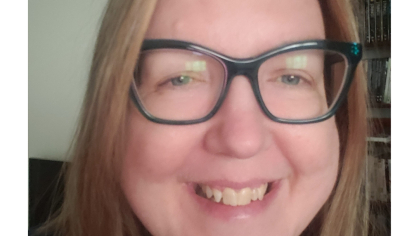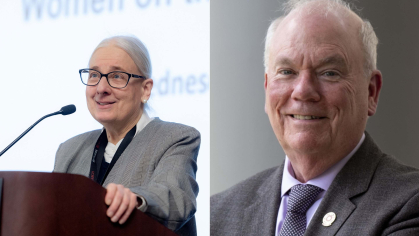Dean to Deliver Remarks at National Conference on the Future of Public Health Leadership

Rutgers Health
Image Credit | Raymond Clinkscale
Perry N. Halkitis, dean of the Rutgers School of Public Health, was recently named the recipient of the J. Michael McGinnis Leadership Excellence Award from the Interdisciplinary Association for Population Health Science (IAPHS). He will formally accept the honor next week at the IAPHS annual conference in Pittsburgh.
In his acceptance remarks, Halkitis reflects on his journey from activist to academic leader and calls on the public health community to lead with courage, equity, and justice.
Read his full speech below, in which he urges leaders to prioritize humanity in public health.
---
I am deeply honored to accept the J. Michael McGinnis Leadership Excellence Award from the Interdisciplinary Association for Population Health Science. To say I am grateful would be an understatement.
This award is especially meaningful because it bears the name of Dr. J. Michael McGinnis—a visionary whose work transformed how our nation approaches public health. His legacy reminds us that advancing population health requires not only rigorous science but also equity, collaboration, and compassion. Michael, to receive an honor that carries your name is a privilege I accept with gratitude and respect.
My path here has been anything but linear. I began not in academia, but in activism—driven by a determination to confront injustice. That spirit eventually led me to the academy, where I was tested early: serving as department chair while still untenured then as associate dean, and later senior associate dean. Each role widened my view of how institutions can advance—or obstruct—equity and inclusion.
Ultimately, those experiences shaped my current role as dean of the Rutgers School of Public Health, where I have served for the past eight years. A journey shaped as much by purpose as by chance.
I have learned that leadership is both art and science—the balance of vision and evidence, compassion and accountability, listening and acting. Whatever skills I possess are not mine alone. They were shaped by people and values that guided me.
Leadership then was not optional—it was survival. It meant raising my voice. It meant organizing. It meant refusing invisibility.
Perry N. Halkitis
First among them: my immigrant parents. Their courage inspired me. But more importantly, they believed my choices were equally brave. They taught me to stand firm in truth and justice and to confront injustice wherever I found it.
That was my first and most enduring lesson in leadership: conviction, rooted in values, sustained by courage.
Leadership was also forged in crisis. As a young gay man in New York City in the 1980s, I lived through the devastation of HIV/AIDS.
I watched friends and peers die while government officials looked away. Silence. Stigma. Neglect.
Leadership then was not optional—it was survival. It meant raising my voice. It meant organizing. It meant refusing invisibility. Like my friend Demetre Daskalakis, with whom I’ve shared this fight for over 30 years, I do not care what speaking out costs me because silence costs more.
I became a leader by doing the work of public health with people and communities. At Gay Men’s Health Crisis, as a statistician and researcher. Through ACT UP, the Hyacinth Foundation, Body Positive, The Tyler Clementi Center, and the public health associations of New York and New Jersey. There, my thinking was tested and deepened. I worked with people who shaped my understanding of leadership.
My partner, Robert Massa, chronicled the AIDS epidemic until his death in 1994. Larry Kramer taught me to speak my mind—respectfully, but never filtered. These experiences reinforced that leadership in public health is not about titles. It is about service: listening to communities, learning from populations, and ensuring our science is accountable to those most affected.
Public health must always be rooted in humanity.
I also learned from many female deans who modeled humility over self-aggrandizement, and the responsibility to foster future leaders. They taught me the importance of knowing when to step aside.
At Rutgers School of Public Health, we will not cower. Unlike colleagues who have shuttered LGBTQ+ programs, we will expand ours—because that is what true leaders do.
Perry N. Halkitis
At 62, I thought that time was near. But given today’s political efforts to dismantle public health, I will hold on a bit longer.
First, because I must. Second, because I love a good fight.
Too many leaders focus on the “I.” While I’ve used it here, let me be clear: this award is not mine alone.
It belongs to colleagues, students, mentors, friends, and communities. It belongs also to those no longer with us—
including my parents, whose memory guides me daily. These lessons helped me build what my colleague Leslie Kantor and I call the "urban public health paradigm." Though born of cities, it has broader relevance—insisting on genuine partnership between public health, medicine, government, and industry.
Public health is not complementary to medicine. It is equal and essential.
These ideas converge in my forthcoming book, Humanizing Public Health. Drawing from decades of work with HIV, COVID, and other diseases, it argues for keeping people—not pathogens—at the heart of our mission. To humanize public health is to center compassion, justice, and equity.
And so, let me speak directly about leadership in this moment.
Too often today we see leaders—whether in government or higher education—who are cowardly. They privilege wealth and status over confronting injustice. They cower when they should act.
At Rutgers School of Public Health, we will not cower. Unlike colleagues who have shuttered LGBTQ+ programs,
we will expand ours—because that is what true leaders do.
If we fail, our society will lose not only its moral compass but the richness of cultures, voices, and communities that sustain it. But if we lead—with courage, conviction, and compassion—we can build a future that is stronger, more just, and more humane.
Perry N. Halkitis
And we will not step away from commitments to: environmental justice, reproductive rights, maternal and child health, mental health, substance use, and violence prevention. Through science, education, and community engagement. Especially with those most under attack by government.
When I took the reins in 2017, I pledged to build something unique. That commitment remains central—and it grows stronger in these times.
Leaders do not bend to political whims. Leaders stand firm.
On my desk is a framed picture that says, “ACT UP is watching.” And I say to all of us living through this moment of political terror: everyone is watching.
History will record who spoke and who stayed silent. Comfort today will be shadowed by cowardice tomorrow. As for me, I will take the punches, the bruises, and risk losing my position—because that is what it means to lead.
Enough is enough.
So I close with a charge: For all of us with leadership roles, power, and privilege—use them.
Call out injustice wherever it arises. Do not cower to bullies. Stand firm in defense of the values upon which this country was built.
If we fail, our society will lose not only its moral compass but the richness of cultures, voices, and communities that sustain it. But if we lead—with courage, conviction, and compassion—we can build a future that is stronger, more just, and more humane.
Join me in this ethical disruption—a disruption of the hate destroying the health of our people.
Let us counter that darkness with a disruption rooted in ethics, humanity, and justice. Thank you.


